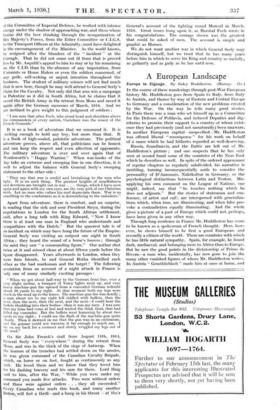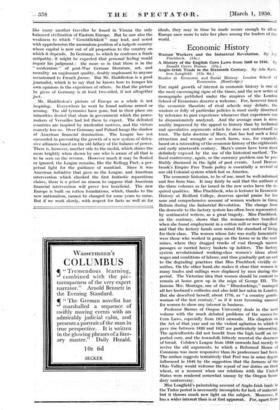A European Landscape Europe in Zigzags. By Sisley Huddleston. (Harrap.
2 la.) IN the course of these wanderings through post-War European history Mr. Huddleston goes from Spain to Italy, from Italy to Austria, and thence by way of Eastern and Central Europe to Germany and a consideration of the new problems created by the War. On the way he tells many good stories: In Paris there was a man who set himself up as a Committee for the Defence of Poldavia, and induced Deputies and dig- nitaries to promise their support to a country of whose exist-. ence they had previously (and not unnaturally) been unaware. In another European capital—unspecified—Mr. Huddleston was offered liberal " recompense " for his work on behalf of a cause which he had hitherto regarded as well-deserving.
Russia, Scandinavia, and the Baltic are left out of Mr. Huddleston's picture ; and one suspects that he has only seen at second hand some of the countries of the Near East which he describes so well. In spite of the ordered appearaned of regular chapters as regularly subdivided, his narrative is rambling, turning inconsequentially aside to consider the personality of D'Annunzio, Naktkultur in Germany, or the psychological distinctions between Latin and Teuton. Mis- applying his own comment on the League of Nations, one might, indeed, say that " he touches nothing which he does not adjourn." But the stories of statesman and con- ference, of artist and café, are interspersed with generaliza- tions which, when true, are illuminating, and when false pro-. yoke a contradiction equally illuminating. And the whole gives a picture of a part of Europe which could not, perhaps, have been given in any other way.
Through long residence in France Mr. Huddleston has come to be known as a spokesman of French thought. Here, how- ever, he shows himself to be first a good European, and secondly a citizen of the world. There are countries with which he has little natural sympathy. Spain, for example, he found dark, mediaeval, and belonging more to Africa than to Europe. But he saw the good points in the dictatorship of Primo de Rivera—a man who, incidentally, has now gone to join the many other vanished figures of whom Mr. Huddleston writes. In Austria " Gemtitlichkeit " made him at once at home, and like many another traveller he found in Vienna the only balanced civilization of Eastern Europe. But he saw also the weakness to which " Gemiftlichlieii " may lead, and noted with apprehension the anomalous position of a tadpole country whose capital is now out of all proportion to the country on which it depends. In Germany, to which he confesses a frank antipathy, it might be expected that personal:feeling would' impair his judgment : the more so in that there is in the " modernism " of post-War German literature, art, and morality an unpleasant quality, doubly unpleasant to anyone accustomed to French finesse. But Mr. Huddieston is a good journalist, which is to say that he knows how to temper his own opinions in the experience of others. So that the picture he gives of Germany is at least two-sided, if not altogether just.
, Mr. Huddleston's picture of Europe as a whole is not inspiring. Everywhere he went he found nations armed or arming. The old tyrannies have gone, but in their place are minorities denied that share in government which the peace- makers of Versailles had led them to expect. The defeated countries are inspired by irredentist motives, and the victors scarcely less so. Over Germany and Poland hangs the shadow of American financial domination. The League has not succeeded in preventing the growth of a new system of defen sive alliances based on the old fallacy of the balance of power. There is, however, another side to the medal, which shines the more brightly when shown by one who is aware of all that is to be seen on the reverse. However much it may be flouted or ignored, the League remains, like the Kellogg Pact, a per- petual light for the guidance of mankind. Since it was American initiative that gave us the League, and American intervention which checked .the first fantastic reparations claims, there is a priori no reason to suppose that American financial intervention will prove less beneficial. The new Europe is built on rotten foundations, which, thanks to the new nationalism, cannot be changed for some years to come. But if we work slowly, with respect for facts as well as for
• - ideals, they may in time be made secure enough to allow Europe once more to take her place among the leaders of the world. - -

























































 Previous page
Previous page